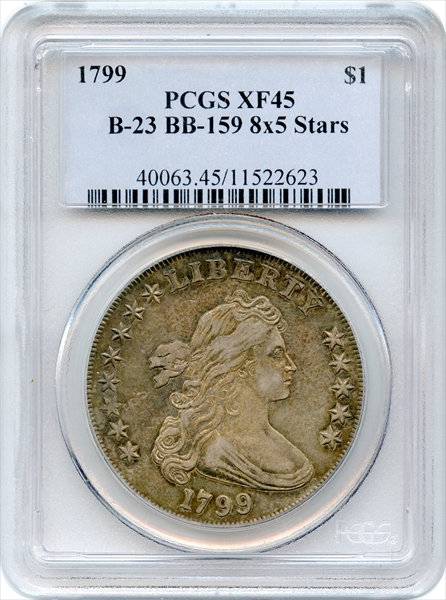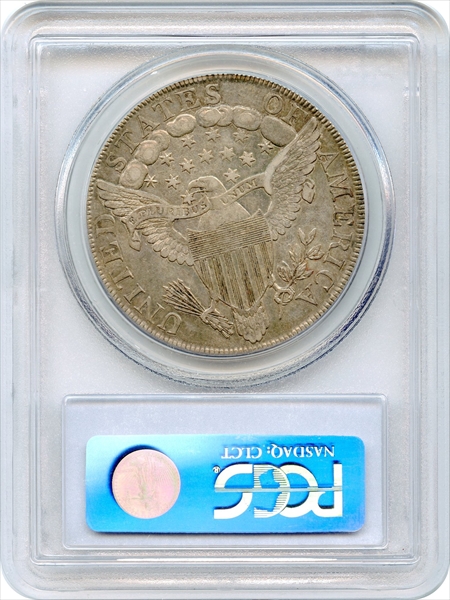1799 $1 BB-159, Stars 8x5 XF45 认证号11522623, PCGS号40063
拥有者评论
B-23, BB-159
专家评论
Q. David Bowers
The following narrative, with minor editing, is from my "Silver Dollars & Trade Dollars of the United States: A Complete Encyclopedia" (Wolfeboro, NH: Bowers and Merena Galleries, Inc., 1993). Note: the Notable Specimens list should be used with caution - it has been updated in my 2013 edition of "The Encyclopedia of United States Silver Dollars 1794-1804."Bolender 23, Haseltine 23
OBVERSE 6: Only 5 stars to right of bust. The obverse stars are arranged eight to the left and five to the right; the only 1799 with this peculiar arrangement. The reason for this configuration is unknown. It may have been a blundered die, or the engraver may have accidentally punched the eight stars on the left after just having cut a die for a 1799 $10 gold coin (all of which have stars arranged 8x5 this year). He would then have been forced to complete the die using only five stars on the right. Given the care taken to prepare dies at the Mint for dollar coinage this year, the 8x5 stars blunder is all the more remarkable.
Obverse die used to strike 1799 BB-159 only.
REVERSE I: See description under 1799 BB-158. U in UNITED defective at upper left, due to broken U punch. Now on BB-159 the upper berries are very small. Far right edge of A is over junction of clouds 3 and 4. Reverse first used to strike 1799 BB•158, during which time it had its first relapping (berries weak), next coining BB-159, then BB-158 again, then, second relapping (removing berries), BB-160 and, finally, BB-161.
DIE STATES:
Die State I: Perfect obverse die; no crack at Band E of LIBERTY, no clash marks. Reverse as inherited from 1799 BB-158, Die State II: Die without cracks or defects. Top two of five berries in branch are weak, especially the one on the left. Scarce die state (with perfect obverse die) for BB-159.
Die State II: Obverse develops crack extending from upper left of E in LIBERTY through lower right of B into field. Reverse as preceding. This is the most plentiful die state for BB-159.
Die State III: Obverse die has clashed with the reverse, and now heavy clash marks from the clouds on the reverse can be seen as incuse "waves" above the date, additional waves are below the lowest two curls, incuse denticles are seen between drapery and border, extending to star 13; crack from star 9 to border; delicate, curved cracks in left obverse field begin at star 4 and at star 7. Reverse as preceding. Scarcer than Die State II.
COLLECTING NOTES: 1799 BB-159, with stars arranged 8x5, is exceptionally popular due to the distinctive obverse. About 500 to 900 are known, so in absolute terms the coin is not rare. However, its popularity as a type has caused specimens to sell for prices far in excess of other 1799 dollars of comparable rarity.
In a year with relatively little to offer in the way of truly notable die varieties and engraving blunders, the 1799 BB-159 is a special favorite due to its distinctive character.
Most specimens are in lower grades through VF, although EF coins are available at intervals. The literature describes certain pieces as AU or Uncirculated. It is not certain how many coins called Uncirculated years ago would qualify for this grade under today's tightened interpretations by such services as NGC and PCGS.
NOTABLE SPECIMENS:
Boyd Specimen. MS-63. Numismatic Galleries, World's Greatest Collection, F.C.C. Boyd, 1945:87. Abe Kosoff, ANA Convention Sale, 1949:190. Stack's, Harold Bareford Collection, 1981:415. "Brilliant Unc. and a cameo-like gem. Wholly prooflike and an exceptional impression obverse and reverse. Superb steel and golden toning with russet highlights. "
Brand Specimen. MS-63. Virgil M. Brand (tentative pedigree). Burdette G. Johnson. New Netherlands 48th Sale, T. James Clarke Collection, 1956:638. "Choice Unc. Somewhat off-center upon the obverse, although uniformly struck; Liberty's head almost cameo like. Weak and dulled upon the usual high spots, but a magnificent, mirror surfaced blue, rose and steel."
Auction '82 Specimen. MS-60. Paramount, Auction '82, 1982:1742. "Unc.-60. Sharply struck and perfectly centered. The medium toning is completely original and very pretty. The center is violet and gold while the periphery has shades of blue and green. The surfaces have very few marks."
DeCoppet Specimen. MS-60. James Kelly, Andre DeCoppet Collection, 1955. "Unc., with beautiful lustrously toned surface. Very slight scar below bottom curl of hair."
French Specimen. MS-60. Stack's, 1989:226. "Brilliant Unc. Frosty and satiny, with iridescent and russet toning. The terminal state of the die, with an arc-like crack from star 1 across neck to below star 13, resulting in massive bulging of the die."
Kensington Specimen. MS-60. Bowers and Ruddy, Kensington Collection, 1975:795. "Choice lightly toned Unc."
Los Colinas Specimen. MS-60. Steve Ivy, 1981:972. "Attractive original toning of even depth covers each side. The strike is full, with good detail in Liberty's hair, the eagle's breast feathers and wings and the clouds on the reverse. The surfaces are free of detracting marks and extremely choice in appearance."
Ostheimer Specimen. MS-60. . Ostheimer, 3rd Collection (Lester Merkin, 1968), "Pale golden toned Unc."
Austin Specimen. MS-60. Austin Collection (Bowers and Ruddy, 1974), Unc, with minor marks.
Carter Specimen. MS-60. Amon Carter, Jr. Collection. (Stack's, 1984). Brilliant Uncirculated.
PCGS #
40063
设计师
Robert Scot
边缘
Lettered: HUNDRED CENTS ONE DOLLAR OR UNIT
直径
40.00 毫米
重量
27.00 克
铸币数量
423515
金属成分
90% Silver, 10% Copper
更高评级数量
9
评级较低的钱币数量
18
地区
The United States of America
价格指南
PCGS 数量报告
拍卖 - PCGS 评级的
拍卖 - NGC 评级的

























